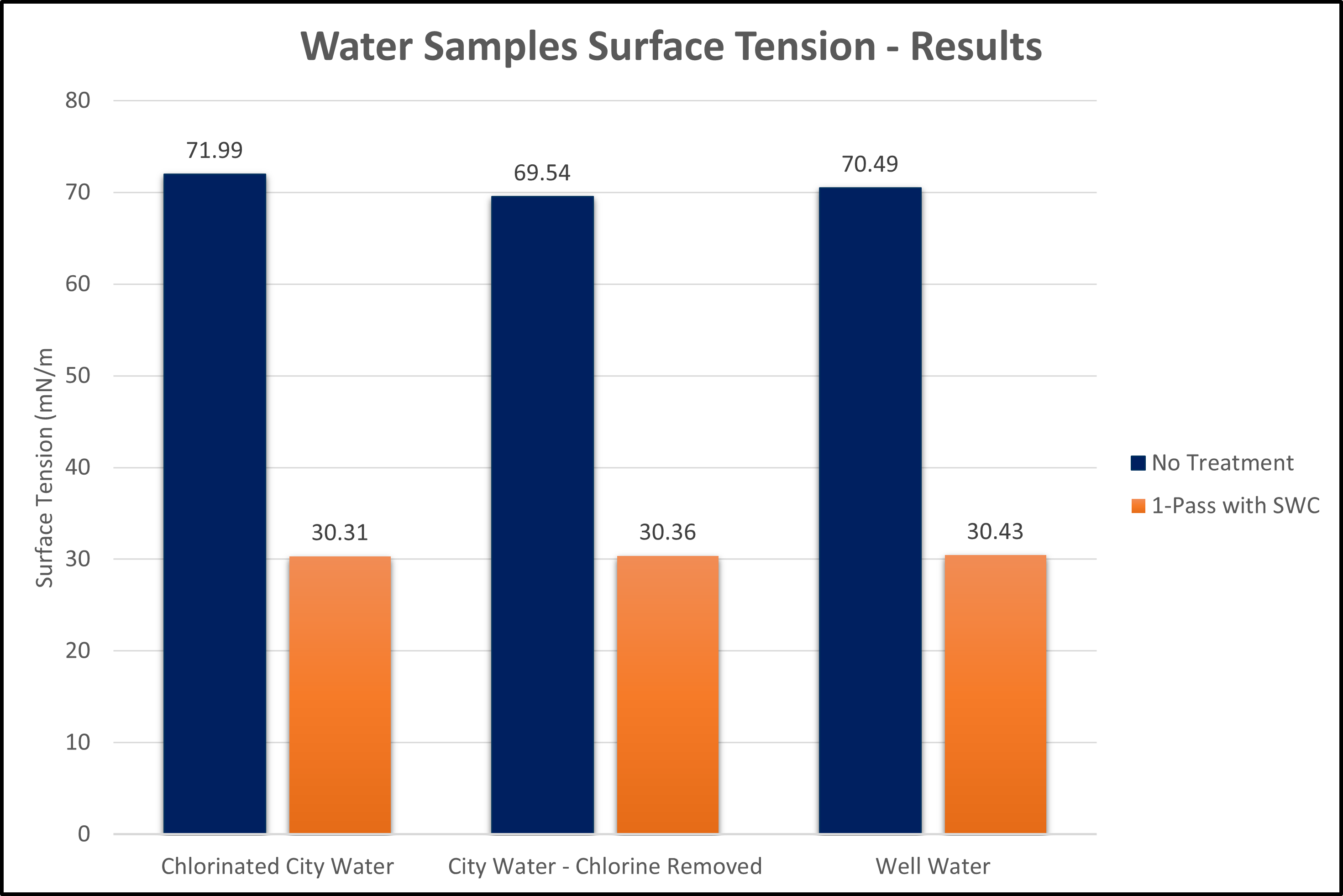At Superior Water Conditioners, we’ve always been confident in the effectiveness of our product, but we believe in backing up our claims with solid evidence. That’s why we recently partnered with an independent laboratory to conduct a thorough test on our product’s ability to reduce the surface tension of water.
We’re excited to share that the results came back in full support of our claims. The lab’s findings confirmed that water passing through the Superior Water Conditioner experiences a significant reduction in surface tension. This is a crucial factor in numerous applications, as lower surface tension can improve the performance and efficiency of processes involving water.
Water Surface Tension Analysis
The objective of this test was to measure the surface tension of three types of water—chlorinated city water, dechlorinated city water, and well water—before and after passing through the Superior Water Conditioner. To conduct the surface tension test, three water samples were provided to the Greater Lakes Krűss lab. These samples, sourced from different locations in Fort Wayne, Indiana, included chlorinated city water, dechlorinated city water, and well water. Each sample was tested using the Wilhelmy method to establish a baseline.
The Wilhelmy Method for Measuring Surface Tension
The Wilhelmy method is a technique used to measure the surface tension of a liquid. It involves immersing a thin, vertically oriented plate into the liquid. The force exerted on the plate due to the liquid’s surface tension is measured as the plate is slowly lowered into or raised out of the liquid. This force, along with the known dimensions of the plate, is used to calculate the surface tension. The method is widely used because it is straightforward and provides accurate results, especially for liquids with low viscosity as shown in (Fig. 1).

Fig. 1 Direct Measurement of Surface Tension Without Correction
Testing Procedure
The test where conducted using the following procedures to establish a standardized, repeatable process that ensures consistency, accuracy, and reliability in the results.
1. A Tensíío tensiometer from KRUSS was validated by measuring surface tension of distilled at room temperature using a cleaned, flame-treated Wilhelmy Plate. Literature value states that surface tension of distilled water should be 72.8 mN/m +/- 1 at 20°C. The distilled water measured 72.28 mN/m prior to testing the samples from Superior Manufacturing, LLC.
2. The surface tension of CITY WATER with CHLORINE was measured at room temperature using a cleaned, flame-treated Wilhelmy Plate.
3. The sample of CITY WATER with CHLORINE was passed through the Superior Water Conditioner 1x by and the sample was measured using a cleaned, flame-treated Wilhelmy plate.
4. Steps #2 and #3 were repeated for the remaining samples, CITY WATER CHLORINE REMOVED and WELL WATER.
The Results
The testing by KRŰSS Labs provided us with positive results for the effects of a Superior Water Conditioner. The lab measured the surface tension of three types of water—chlorinated city water, dechlorinated city water, and well water—both before and after passing through the Superior Water Conditioner. Using the Wilhelmy method, the tests demonstrated a clear reduction in surface tension across all water samples after treatment of more than 50% (Fig. 2).

Fig. 2 Results of Wilhelmy Test on Conditioned Water
These positive results reinforce our commitment to innovation and quality, ensuring that homeowners receive a product that truly delivers on its promises. Whether it’s improving the efficiency of your home’s water system or enhancing the effectiveness of cleaning and gardening, our solution not only meets but exceeds expectations, that are validated by scientific testing.
What Does This Mean for YOU the Homeowner?
A reduction in water’s surface tension has several practical benefits for homeowners and residential applications:
1. Improved Cleaning Efficiency: Lower surface tension allows water to spread more easily and penetrate surfaces better. This means cleaning agents mixed with water can be more effective at removing dirt, grease, and grime from various surfaces, leading to cleaner homes with less effort.
2. Enhanced Water Absorption: Reduced surface tension helps water to be absorbed more readily by porous materials like soil, fabrics, or wood. This can improve the efficiency of watering, making gardening and lawn care more effective, and ensuring that cleaning solutions penetrate deeper into surfaces like carpets or upholstery.
3. Better Detergent Performance: When water has a lower surface tension, detergents and soaps can work more effectively, requiring less product to achieve the same level of cleanliness.
4. Preventing Water Spots: Water with reduced surface tension is less likely to form droplets that can dry into spots on surfaces like glass, dishes, and shower walls.
Overall, reducing water’s surface tension can enhance many everyday tasks, making them easier, more efficient, and potentially more cost-effective for homeowners.